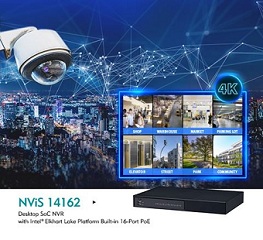
The demand for seeing more and more details has pushed the evolution of resolution for years, from 480 pixels, 720 pixels all the way to 1080p and now 4K. With ever-growing resolution, the thirst for capacity has also challenged the status quo of video surveillance application. Striking a perfect balance at both ends is a non-stop battle, as making every bit of resource count is what really matters, especially for SMB customers.
Built upon the popular compact NVIS 1482, Nexcom’s NVIS 14162 ups the game with advanced features previously available only on high-end/ premium models. The dual RAID mode allows quick switch between full throttle performance and redundant backup, while the presence of PoE eliminates complex wiring, making the NVR appliance even more versatile in multiple scenarios.
Powered by Intel 8th Gen Elkhart Lake Pentium J6426 SoC processor, with upgraded Gen 11 UHD Graphics 32EU integrated graphics engine, this NVR solution is powerful enough to record in full HD resolution and 2M frame rates with 16ch camera. Built-in Intel TPM 2.0 offers enhanced security for those who need extra peace of mind in access control or data leak prevention.
The beauty of owning multiple drives of massive capacity is a luxury for NVR configuration. The NVIS 14162 comes default with two drive bays, ready to take a 2.5” or 3.5” drive for each. Dual drives could be further configured through a RAID mode switch. The NVR storage speeds up for high performance under RAID 0 while RAID 1 mirrors data for an extra copy of backup, bringing extra flexibility for system builders and administrators in the field application.
One complementary 2.5” drive can also be added, serving as system cache, which significantly boosts overall performance when the system is under heavy load. When coupled with an extra M.2 slot for SSD as the master drive and rest of hard drives being the slave, the slender beast performs admirably yet cost-effective at the same time. Dual drives with RAID modes by switch, additionally, enhancing the convenience of various backup plan, including offsite/ cloud backup options from remote.
Power over Ethernet (PoE) started to gain ground back in the early 2000s for niche applications, and not until the most recent years had it taken off as primary technology in commercial appliances. Through transmitting and receiving data and power over the same cabling, we could reduce the solution weight as well as cost of deployment.
The NVR appliance is thus capable of supporting eight 10/100 802.3at PoE ports (or sixteen 802.3af), making it more budget friendly for different sizes of project. On top of being economical on space and power consumption, plug & play is made possible through PoE functionality, making camera setup quick and intuitive.











